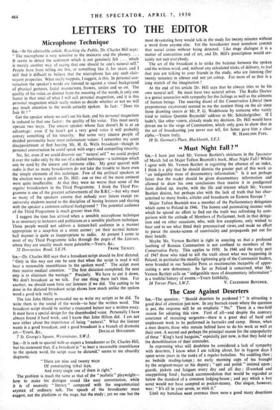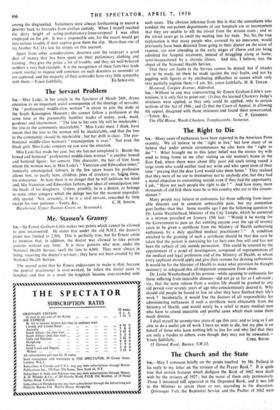The Case Against Deserters
SIR,—The question: "Should deserters be pardoned ? " is attracting a good deal of attention just now. In any barrack-room where the question is put, the response will be an emphatic "No." There is a two-fold reason for adopting this view. First of all—and despite the contrary assurance of recruiting sergeants—there is a great deal of hard and unpleasant work to be performed in barracks and camp. Hence, when a man deserts, those who remain behind have to do his work as well as their own. A second and perhaps the principal reason for the unpopularity of these "King's hard bargains," especially just now, is that they hold up the demobilisation of their comrades.
In expressing what will doubtless be considered a lack of sympathy with deserters, I know what I am talking about, for in bygone days I spent seven years in the ranks of a regular battalion. No coddling then ; no bedside reading-lamps ; no early morning cups of tea brought by the sergeant-major or his deputy ; "spit and polish" insisted upon ; guards, pickets and fatigues every day and all day ; ill-cooked and unappetising food ; barrack accommodation that would be regarded as below the standard of a common lodging-house ; and pay which a boy scout would not have accepted as pocket-money. Our slogan, however, was: "It's all in your seven, so stick if."
Until my battalion went overseas there were a good many desertions among the disgruntled. Volunteers were always forthcoming to escort a deserter back to barracks from civilian custody. When I myself reached the dizzy height of acting-probationary-lance-corporal I was often employed on the job. It was a responsible one, for the escort would get into serious trouble if their captive gave them the slip. More than one of my brother N.C.O.s lost his stripes on this account.
Apart from other considerations, deserters cost the taxpayer a good deal of money that has been spent on their preliminary clothing and training ; they give the police a lot of trouble, and they set well-behaved soldiers a very bad example. It is the recognition of these facts that leads courts martial to impose stiff sentences on such deserters as surrender or are captured, and the majority of their comrades have very little sympathy







































 Previous page
Previous page